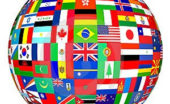Molly Minturn - My family is heartbroken to share that my father died in surgery on Monday, Feb. 10. It…
Wednesday Night #1453
Written by Diana Thebaud Nicholson // January 6, 2010 // Cleo Paskal, Herb Bercovitz, Reports, Wednesday Nights, Westmount // 1 Comment
Leonard Cohen Poet-in-residence at Westmount High
With a background of the soundtrack of some of the poet’s wonderful songs, Ginette Sauvé Frankel introduced Jack Locke, poet, founder of the Foundation for Public Poetry, and editor of “Leonard Cohen You’re Our Man – 75 poets reflect on the poetry of Leonard Cohen. It is indicative of the incredible turn-around of Westmount High, now a formidable competitor for such established private schools as LCC and Selwyn House, that a poet-in-residence program has been established in the name of one of its most illustrious graduates. All proceeds from sales of the book go toward the creation of the program. In presenting the book, Jack noted that Margaret Atwood had been the very first contributor. An additional treat was the video of the charming message delivered by Canadian astronaut Bob Thursk from the International Space Station on September 21st, Leonard Cohen’s 75th birthday, which was made possible by our MP and Wednesday Nighter, Marc Garneau.
The economy and the market
The fallout from the 2009 economic disaster, although sometimes masked, is not yet over. Money rescued from a falling market continues to look for a home. With people eager to invest in an undervalued situation, 2010 promises to be positive. The current interest rates below the rate of inflation, cannot be sustained indefinitely, making bonds a potentially hazardous investment as their value is expected to drop as interest rates rise. The balance sheets of Canadian banks may not completely reflect the risks, a situation that will probably continue for a while. Low interest rates have fuelled the housing market and it is difficult to predict the extent of the effect of an inevitable rise in interest rates on that market. There is a possibility of some problems with mortgages becoming due. Hard assets such as gold or oil would appear to be a better investment target. Twenty-five percent of the mortgages in the U.S. are said to be problematic and some banks are said to be carrying overvalued assets on their books. Ultimately these problems will have to be faced. The viability of pension plans is a source of concern to some as more pension plans are investing more heavily in bonds in order to favour presumed stability over unfavourable stock market fluctuations. On balance, the outlook for companies in 2010 looks much more favourable than in 2009 but although the fundamentals are still quite good and the markets still appear to have momentum, the market might prove to be somewhat sluggish in 2010. The first quarter, at least, is expected to be quite strong with the earliest likely pause in the market predicted to occur in May of this year. Thanks to their hard assets, Canada, Norway and Australia are favoured countries in the investment world. Foreign investors favour Canadian banks and the Canadian dollar, foreshadowing a possible rapid rise in the Canadian dollar, predicted by some to possibly reach $1.11 U.S.
Following the recent impressive stock market recovery, it is difficult to predict beyond the first quarter of 2010, with predictions of both gloom and glory gaining equal credence.
President Obama and the U.S.
Physical attractiveness and articulate presentation appear to have overshadowed administrative skills as criteria for the election of politicians since the advent of television in the 1940’s. This appears to have been glaringly evident in the presidential contest between Kennedy and Nixon. President Obama stirred the expectations of the American public with an impressive appearance and brilliant oratory. In retrospect, faced with the self-interest and self-deception of some of the legislators, it was inevitable that his Medicare bill would be watered down and the inherited debt, the lack of success of the flagging war in Afghanistan and last year’s financial crash – all beyond his ability to deflect – would lead to disenchantment in those who saw him as the great Black hope.
Disappointed, some view President Obama as one who has failed to use his verbal skills to explain to the U.S. public in terms that they can understand, the true situation, the limits of that country’s capabilities and the compromises that must be made. Gordon Brown in the U.K. is in a similar situation, the difference being that the situation there has been clearly explained to the British public which accepts the inevitable. Canada, in a similar situation fifteen years ago, bit the bullet and is now reaping the awards.
Other Wednesday Nighters see President Obama in an impossible situation, caught between his expectations, his dream for his country and the reality of his job. Ultimately, the U.S. has demonstrated an incredible ability to recover from difficult situations and the debt situation could be resolved by inflation, but the population does not yet appear to have been made aware of and does not fully understand the current situation and its causes. The expectations of a new, different, better United States may very well remain unfulfilled due to the possibility that this great president might be limited to one term if the Republicans can produce a charismatic, articulate candidate.
T H E I N V I T A T I O N
According to western Christian tradition January 6 is the celebration of the visit of the Three Kings/wise men/Magi to the infant Jesus. Details of their origins are vague – some believe they came from Persia (Iran), others say Babylonia (Iraq) and still others Yemen. Lacking GPS, they followed a star, and came from the East. By our reckoning that pretty well eliminates Yemen, but possibly that country has moved. They came bearing gifts (commodities) of Gold, Frankincense and Myrrh, at least one of which has retained its commercial value (we’re not sure about the Myrrh market) [Clarification: Ron Robertson advises: actually though gold has appreciated more, the other two are still very expensive.], just as the countries of the Magi’s provenance have retained their geopolitical interest. All of which provides a hook for this Wednesday Night.
No, no discussion of the Magi’s camels’ methane emissions is expected. Rather, as is tradition at the beginning of the New Year, we propose an evening of merriment (that might be stretching it) devoted to topics related to the economy and the geopolitics which will either drive – or be driven by – it.
Before we go there, however, Ginette Sauvé Frankel will introduce Jack Locke, editor of “Leonard Cohen You’re Our Man-75 poets reflect on the poetry of Leonard Cohen.” All proceeds from sales of the book go toward the creation of a Leonard Cohen Poet-In-Residence program at his former school, Westmount High.
Returning to the economy, some suggestions:
Economic Forecasts for 2010 and the Coming Decade from the Atlantic offers views of four well-known names, all participants in the American Economic Association meeting, starting with Paul Krugman , continuing through Ben Bernanke , Donald Kohn and Martin Feldstein, who, while not denying the “serious cloud over the near-term economic outlook” says he “will make the plausibly optimistic assumption that the economy will fully recover over the next ten years.”
We wonder if Mr. Feldstein has taken into consideration the news that US public pensions face $2,000bn shortfall [Our favorite Wednesday Night economist reminds us that “Feldstein made his early reputation with work on Social Security problems, thus he is likely aware of the US funding shortfalls. What is perhaps not intuitively obvious about this issue, is that the funding shortfall is part of the unrecorded national debt, inasmuch as taxpayers will have to make it up.”]
David Hale suggested (in September, brave man) that there would be More good news than bad when it comes to what’s ahead in the next 15 months
In November, the OECD More Than Doubles 2010 Forecast, as China Leads the World Out of the Recession, while on January 4, Reuters quotes John Lipsky: IMF forecast to reflect upbeat expectations and the Financial Times offers a buffet of economists to answer their question: To what extent will emerging economies remain the drivers of global economic growth in 2010?
It will come as no surprise that some feel that “Forecasting for 2010 is difficult given the mixed signals still coming from economy.” Despite the recent positive news, it seems the Bank of England is still fearing deflation and a Japanese style double dip recession. Their recent message pulled no punches saying this is one of the worst recessions ever.
And if you want still more inspiration, see The Market Oracle Academic Economists and Futurologists Make Worthless Forecasts 2010
On a somewhat related subject, there have been a number of Wednesday Night debates regarding how to limit the exorbitant compensation of financial services executives, with proponents of taxation as the cure. Others have suggested that such measures would only drive the financial services companies away from their current countries of domicile. The latter may feel vindicated by the Telegraph story: Goldman Sachs teams could quit the City over taxes and regulations. So, any other suggestions?
As we learned many years ago in Carl Beigie’s company, economics – dismal as it may be – is not a stand-alone science. Therefore, any consideration of the global economic outlook must inevitably take into consideration political developments in far-flung and sometimes neglected parts of the world. We offer a few starters and there are no doubt many you will add:
— The courageous and seemingly unquenchable unrest in Iran and the effect – if any – on that country’s future as a potential nuclear power.
— The relationship between China and India – a must-read is our Cleo’s analysis of the Copenhagen consequences for the U.S., China and India
— Deteriorating relations between the U.S. and Japan
— Yemen, Somalia, Zimbabwe and other failed/failing states – we are inclined to include Afghanistan
— The longer-term consequences of the latest terrorist attempt by the “underwear bomber”. This brings us to a question raised by George Archer about whether al-Quaeda exists as an organization (he cites the BBC documentary of 2005 questioning whether the threat of terrorism to the West is a politically driven fantasy and if al-Qaeda really is an organised network.) Major food for thought and discussion.
— Whither the European Union in its new incarnation?
— Tying this all together (this is for Kimon): Economist Daron Acemoglu asks What Makes a Nation Rich? and concludes that the key is good governance, starting with free elections.
Finally, who noticed that Dubai’s latest extraordinary (excessive) development has been hastily renamed Burj Khalifa bin Zayed in honor of the ruler of Abu Dhabi, who bailed out Dubai last month – now, does either country have free elections?




One Comment on "Wednesday Night #1453"
Superb review of the state of the world. One of the very best I have read in the last months.
Happy new year 2010 from warm Puerto Vallarta!
Back in Montreal on the 12th
Con tanti saluti cari’ Tullio